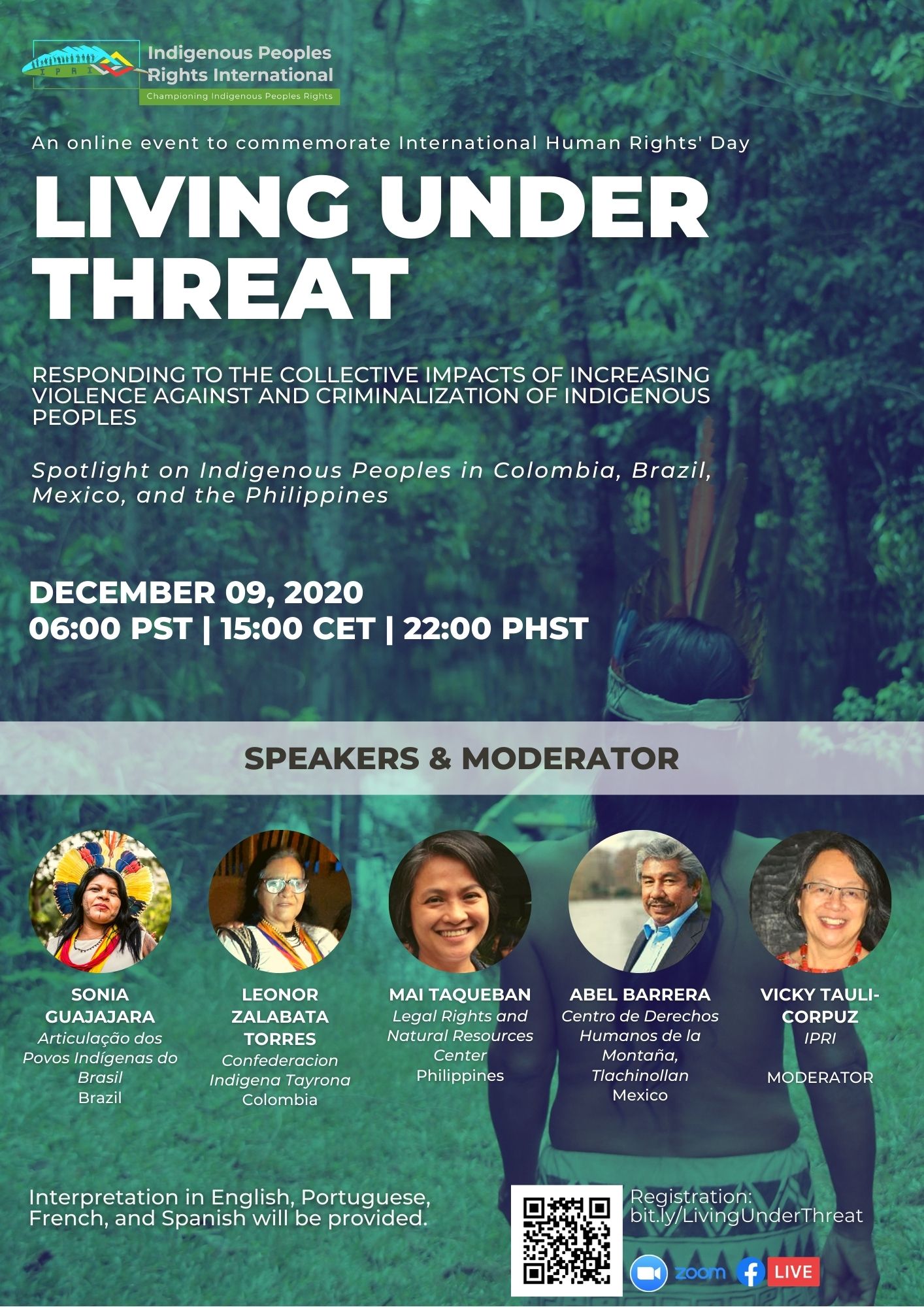
BACKGROUND
During his term, UN Special Rapporteur Rodolfo Stavenhagen used the expression ‘implementation gap’ in reference to the growing recognition of the collective and individual rights of indigenous peoples within international human rights law and even in domestic Constitutions and legislation, that was not met with real changes on the ground for the lives and survival of these peoples all over the world.
Subsequent Special Rapporteurs registered the same situation, even after the adoption of the landmark UN Declaration on the Rights of Indigenous Peoples (UNDRIP). As further reported by former UN Special Rapporteur Tauli-Corpuz, violence and criminalization faced by Indigenous Peoples and communities, particularly when defending their lands, territories and natural resources, is a serious and growing concern.
The situation during the COVID-19 pandemic, and the possibility that the efforts for the so-called ‘economic recovery’ are again based on mindless extraction of natural resources, as assessed by current UN Special Rapporteur Francisco Calí, depict an alarming scenario for the respect and realization of the rights of Indigenous Peoples in the near future. To address ongoing violations and prevent future abuses, the international community should live up to its international human rights commitments and act now to ensure that the rights of Indigenous Peoples are fully respected and protected.
In 2019, the Indigenous Peoples’ Rights International (IPRI) was founded to respond to these concerns. The work of IPRI is focused in addressing, through reports, campaigns, lobby and other strategies, the impacts of violence against and criminalization of Indigenous Peoples and the related impunity of perpetrators, particularly taking into account the collective impacts of these human rights violations. Among other actions, IPRI has developed a legal and sanctuary fund to support Indigenous individuals and peoples suffering these situations.
Within the framework of the celebration of the UN International Human Rights Day 2020, this webinar wants to call the attention on the attacks on Indigenous Peoples’ collective rights to their lands and resources and to their self-determination, autonomy and self-government. These collective rights, enshrined in the UN Declaration, are essential to their collective well-being and survival as distinct peoples. It will also present how Indigenous Peoples are responding to challenges, and share the work of IPRI and its proposed actions to confront this situation.
OBJECTIVES
The webinar has two objectives:
- Underline the importance of the collective rights of Indigenous Peoples and, at the same time, the collective nature of the impacts of the violations of their human rights, through the presentation of key problems in the following focus countries: Brazil, Colombia, Philippines and Mexico.
- Share the relevance of the work of IPRI regarding violence and criminalization suffered by Indigenous Peoples and its focus on the collective dimension of these problems.
CONTENT
Panelist will present their views discussing the following questions:
- Undermining indigenous self-determination, autonomy and self-governance: Colombia Indigenous Peoples after the Peace Accords
- Legislative actions criminalizing Indigenous Peoples – the Anti-Terrorism Law in the Philippines and its impact on Indigenous Peoples collective and individual rights
- The strength of Indigenous Peoples confronting the old and new threats of unsustainable development in Mexico
- Violence and criminalization in an environment of regression on recognized rights: situation in Brazil
SPEAKERS / MODERATOR
Victoria Tauli-Corpuz
IPRI Global Co-Director
Former UN Special Rapporteur on the Rights of Indigenous Peoples
Vicky is an indigenous activist from the Kankana-ey Igorot people of the Cordillera Region in the Philippines. She is the founder and current executive director of Tebtebba Foundation (Indigenous Peoples’ International Center for Policy Research and Education) in the Philippines.
Sonia Guajajara
Coordinator, Articulação dos Povos Indígenas do Brasil
Brazil
Sonia is an environmental and indigenous activist and politician from Brazil. She regularly participates in international fora, such as the UN Human Rights Council and the UN Climate Negotiations. She was recently named one of the 100 Most Influential Latinos Committed to Climate Action.
Leonor Zalabata
IPRI Global Board Member
Human Rights Commissioner, Confederacion Indigena Tayrona
Colombia
Leonor is an indigenous activist from Arhuaco Organization in Sierra Nevada de Santa Marta, del Cesar, Colombia. She is the Human Rights Commissioner of the Tayrona Indigenous Confederation (Confederacion Indigena Tayrona) and representative of the National Commission of the Indigenous Peoples of Colombia.
Mai Taqueban
Executive Director, Legal Rights and Natural Resources Center
Philippines
Mai is a lawyer and professor in the Philippines. She is among the lawyers who filed a petition on behalf indigenous and Moro peoples from the Cordillera to Mindanao against the Anti-Terror Law.
Abel Barrera
Founder and Director, Centro de Derechos Humanos de la Montaña, Tlachinollan
Mexico
Abel is a Mexican anthropologist and human rights activist. He was awarded by Amnesty International with the 2010 Robert F. Kennedy Human Rights Award for his works at the Center for Human Rights of the Mountain of Tlachinollan in Guerrero.

